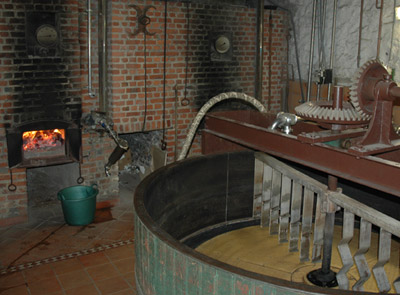More about tradition . . .
The headline is a quote from W. Somerset Maugham and the following paragraph from winemaker Annette Hoff:
. . . a philosophical struggle I have been dealing with the last few years, and that is the idea that can a wine be made traditionally in modern times? How could it truly be traditionalâ when made with modern equipment, commercial yeast, in stainless steel or plastic bins, with modern manipulation, technological know-how, bottling lines, etc. etc.? A “traditional” wine, in my mind at least, would seem to have been made by folks who are more in touch with nature, the soil and the seasons, than most folks are today. But, in spite of all of this, I truly believe I’m making a traditional product, but my problem was that I haven’t had a whole lot of evidence to back this idea up, even to myself.
Just substitute the word beer for wine and give it a little thought.

Worth considering whether you are arguing about lambic or considering an American (Imperial-Double-India) pale ale with more hop flavor than any other beer in history.
You could also paraphrase Maugham’s line as “Syle is a guide and not a jailer”. Recalling Phil Markowski’s brief essay on beer styles included in Farmhouse Ales, that helped me get away from the shackles of style. Being a beer Aristotlean, I was never quite satisfied with the assumed Platonism of our community. The mystery, of course, is in the thing (in this case, the beer) rather than the ideal form—and if more forms are discovered than we are all the richer for it.
Donavan,
I agree that Phil’s discourse on style was spot on. I worry what limits we might put on brewers by always asking “what style is this?” and making immediate judgments.
But I also think that the work that Michael Jackson and Fred Eckhardt did in describing styles more than 20 years ago was an important element in the craft revolution.
“Oh, that was a pale ale (or a stout or a porter) – I like that.”
In a similar vein, wine consumers have certainly taken to buying wine based upon the name of the primary grape rather than some French appellation they don’t understand.
The important thing is to think of styles as families and what Jackson and others have gone as descriptions rather than definitions.
And when you get a beer like Allagash Curieux you realize the word style doesn’t belong in the same sentence with it.